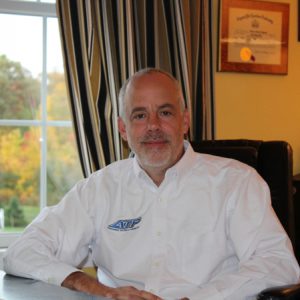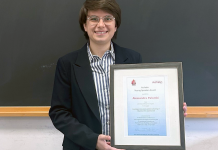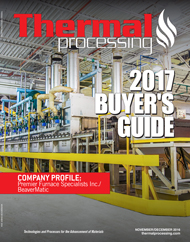
How did ATP get started?
During the early 1990s, the National Aerospace and Defense Contractors Accreditation Program (Nadcap) began embracing all special processes, and we saw a need in the aerospace industry for calibration and testing services to meet the pyrometry standard, AMS2750. In 2007, I created Aerospace Testing & Pyrometry (ATP) with the aim of promoting a stronger focus on the aerospace compliance issues relative to pyrometry and its integration with the thermal processing of metallic materials.
The belief of ATP is for our clients to profit from our knowledge, because quality is the ATP standard. The current ATP team has accumulated a wealth of knowledge. Colin Thomas, the ATP technical consultant, is a heat-treat specialist who has been in the industry for over 40 years and had functioned as a Nadcap auditor for 10 years. Today, Colin is operating on the other side of the fence, helping our clients navigate through the challenges of Nadcap accreditation.
Dale Praznik leads the ATP ISO 17025 accredited pyrometric metrology calibration laboratory providing calibration services for secondary standard and field test instruments. Dale has been in the metrology industry for over 40 years, and his presence on the ATP team is considered a great asset. Concurrently, ATP opened a West Coast service office, operated by Richard Rasmussen.
When utilizing ATP pyrometry services, consulting, and training, our clients can benefit from our knowledge and understand how best to achieve and maintain compliance. Any non-conformance issued during Nadcap audits can cost a company up to 40 man-hours to address. ATP can provide resources to minimize or eliminate non-conformances, thereby reducing costs.
Describe ATP’s services.
ATP provides instrument calibration, system accuracy testing, and temperature uniformity surveys. ATP also provides pyrometry training, heat treat consulting, and Nadcap compliance assessments. As a bonus, we offer our expertise with the preparation of descriptive procedures and assisting with rigorous root cause and corrective action demanded by the Nadcap process.
ATP is one of the few companies in the industry that offers pyrometry services as well as providing Nadcap consulting. Approximately 90 percent of our clients are aerospace, but ATP provides service to automotive, pharmaceutical, chemical processing, and recently, the composites industry. In addition, a new accreditation program, MedAcred, is targeting medical device manufacturers that produce hip implants, knee replacements, etc. If these organizations are performing special processes such as heat treatment, they will need to be accredited similar to the Nadcap process.
How do you help customers?
ATP does not simply place a sticker on an instrument and walk away. ATP will build and set up pyrometry programs for the client that makes sense. We start with analyzing what is required, confer with the client and perform the agreed-upon calibration and tests. ATP establishes a protocol that follows requirements to ensure that clients are integrated into the ATP recall system, allowing ATP to be responsive when needed.
ATP service technicians have a wealth of knowledge and experience, and they strive to build trusting relationships with our clients. We want them to look at ATP as an extension of their organization. ATP has a 98 to 99 percent approval rating from our existing client base for consulting, training, and services, and ATP is constantly striving for 100 percent.
Tell us about the ATP training.
Training is customized. This means, if you only have vacuum furnaces, only vacuum furnace heat treat practices shall be reviewed. Pyrometry training is performed at the client facility, which allows opportunity to discuss the specific equipment issues. The applicable requirements of AMS2750 and/or other aerospace prime-specific requirements shall be part of the training. For example, GE Aviation has its own pyrometry specification with requirements that differ from AMS2750. Training on-site adds a better learning experience where specific issues can be discussed and recommendations made relative to instrument calibration and testing and reporting practices.
Additional training can be provided: Rockwell and Brinell hardness testing, micro indentation, conductivity, heat-treating fundamentals, and importantly, how the Nadcap process functions.
How does ATP handle challenges?
Organizations wishing to begin the Nadcap accreditation process or maintain accreditation are faced with difficult challenges. The Nadcap accreditation process is rigorous. Without commitment from management and the resources available, a failure condition is a reality. Achieving successful Nadcap accreditation one year is no guarantee that the subsequent Nadcap audits will be without their challenges. Constant oversight is required. ATP plays an active role participating in periodic Nadcap meetings and other aerospace and industry bodies to understand the issues, help craft the standards and dialogue with aerospace primes, and share this intelligence with our clients.
How is the industry evolving?
ATP is an active member of Aerospace Metals Engineering Committee (AMEC), which acts as a custodian of heat treating specifications including AMS2750. One major challenge will be the new revisions of the AMS2759 series of standards. These standards have been in the editing process for four years. When these standards are released, it will result in a big impact within the aerospace heat treating community. ATP will be in a position to assist with the understanding and implementation of requirements.
What’s in ATP’s future?
The growth potential within the composites industry will likely create opportunities for ATP. AMS2750/1, which is specific to the pyrometry requirements of autoclaves and bonding and curing ovens, will present challenges to manufacturers.
Also, ATP plans to open additional service offices in the U.S., especially those close to the main heat treat hubs and aerospace primes.
For more information: go to www.atp-cal.com




























